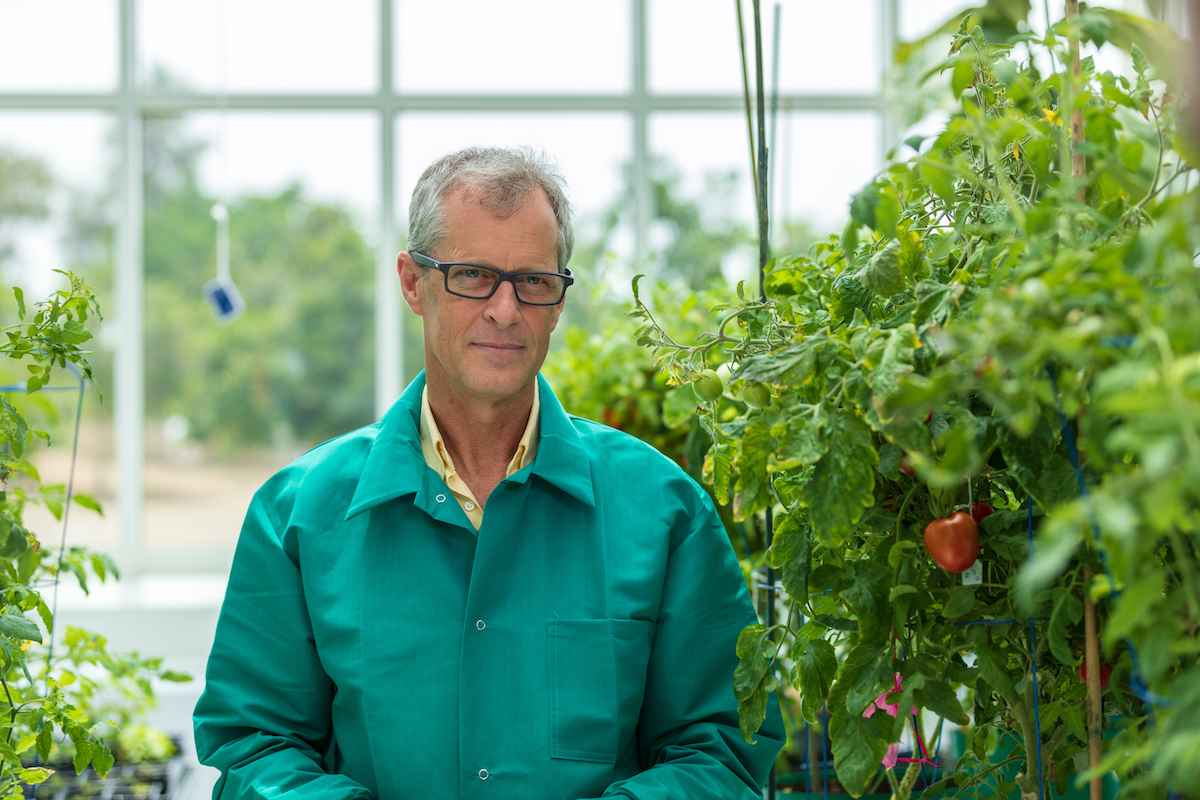KAUST takes semi-saline irrigation to a new level

Mark Tester, KAUST professor of plant science, is working with a team of researchers at KAUST to develop new irrigation technology that will make crop production using semi-saline water possible. Photo by Asharaf Kannearil.
-By Lulwah Shalhoub, KAUST News
A new irrigation technology is being developed at KAUST that will make producing crops using saline water not only possible, but will also take greenhouse horticulture in a new direction.
The new technology is eco-friendly and is deemed to cut agricultural cost by using the seawater that flanks the Kingdom on both its east and west sides. The ultimate goal is to rely on 10 percent freshwater only in greenhouse systems, with diluted seawater used in irrigation—this can bring the overall cost down to 10 U.S. cents for every cubic meter.
"This is the number that we have been aiming for," said Mark Tester, KAUST professor of plant science in the University's Biological and Environmental Science and Engineering Division (BESE).
Recent research conducted by Chinese researchers in the UAE involved the screening of rice varieties from China that performed well in saline conditions. Some of these rice varieties have already been trialed in Dubai, with researchers growing the rice in diluted (10 percent) seawater.
"Rice is very salt sensitive, so 10 percent seawater is about right. That's what we found we can grow rice in as well," Tester said.
Irrigation relies heavily on desalinated seawater; however, desalination is expensive and ecologically costly. For reference, it costs about $1 for every cubic meter. Using desalinated water to irrigate some crops can cost many times the global market value of the crops.
"What we are doing at the moment is completely unsustainable, yet we are told that we have to massively increase food production," Tester said. "By about 2050, we have to grow two-thirds more food. We have to introduce changes and make big leaps. Water is a critical factor in the ongoing increase in food production and we have to be able to use water that we are not using now, which is the salty water."
Red Sea Farms
Tester believes that the key to producing more food in a more environmentally friendly manner is to develop new systems of agriculture that make it possible to irrigate salt-tolerant crops with seawater.
Seawater irrigation "reduces a massive pressure that exists on our freshwater resources globally. A third of our food worldwide is produced under irrigation, and two-thirds of global water use is for agriculture. Every aquifer we are using for agriculture is being depleted," Tester added.
The plant scientist and his team are developing a new company named Red Sea Farms in collaboration with a local investor. The team is working on growing salt-tolerant tomatoes in diluted seawater in a greenhouse that is cooled with undiluted seawater. To further reduce the facility's ecological footprint, dust is removed from the outside of the greenhouse without using water. Tester hopes to cut down on power and water use thanks to technology from KAUST startup NOMADD, which was originally developed to clean solar panels.
"No one else that I know of in the world has done that," he added.
From discovery to product
The Red Sea Farms project brings together plant sciences and engineering. The engineers are working with the materials and some of the dynamics of the process to put together a system that is efficient environmentally and economically. On the plants side, scientists are working to improve the salinity tolerance of the plants.
"With the revolution that we are in the middle of at the moment in biology, we are able to use genomics, which enables us to discover things much faster and deliver them faster," Tester said.
Applying plant genomics to crop improvement can accelerate identifying plants that are salt-tolerant. For example, research that would have taken 10 to 20 years in the past can now be done by a Ph.D. student in about three years—that is discovery to product in less than one-sixth of the time.
Depending on the weather and other factors, the Red Sea Farms greenhouse system will use between 80 to 95 percent seawater. This could mean a 90 percent reduction in the amount of precious energy-intensive freshwater needed to grow conventional crops.
"Not only can we do something amazing—we can also do it commercially, we can do it in an economically viable way, and that is, for me, crucial. We can truly deliver something that can be adopted elsewhere, but we will be the pioneers," Tester said.
Contribution to the Kingdom
The new direction can introduce a whole new industry. It can introduce saltwater-based food production. Tester believes that given the large coastline, sandy soil, unlimited sun and water in Saudi Arabia, there are substantial opportunities to build greenhouses. It can help Saudi Arabia produce more food for itself and even export food to the world.
"We are working on Saudi Vision 2030 goals by making a contribution towards food security of the Kingdom and producing a whole new industry for the Kingdom of truly environmentally sustainable food production that is profitable as well," said Tester.
"Here at KAUST, we have the commitment to make significant contributions to the Kingdom and the means with which to do it. I am able to be really dynamic in my research, and that is very special. Having the experience and commitment combined with the opportunity that KAUST has allows me to make that next leap," he added.
Related stories:
- Harnessing the power of wastewater
- Quest to feed the world
- A bright future for sustainable agriculture

